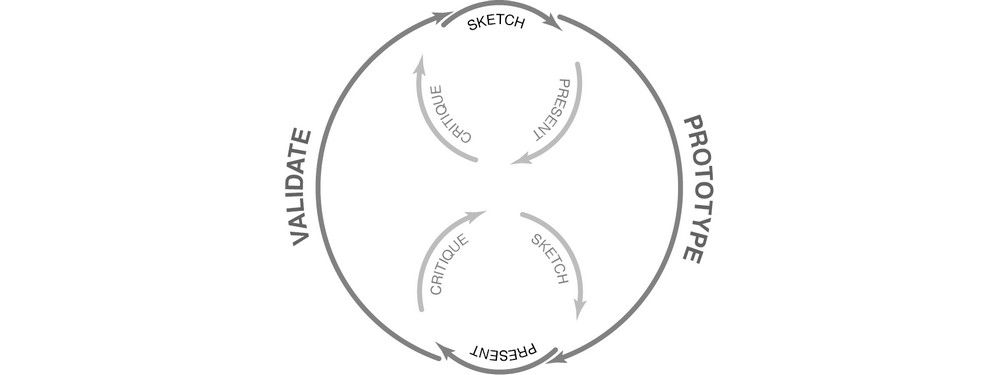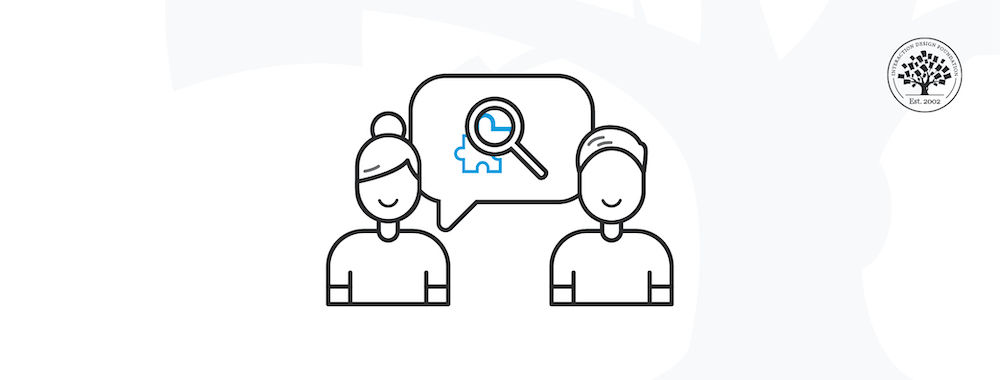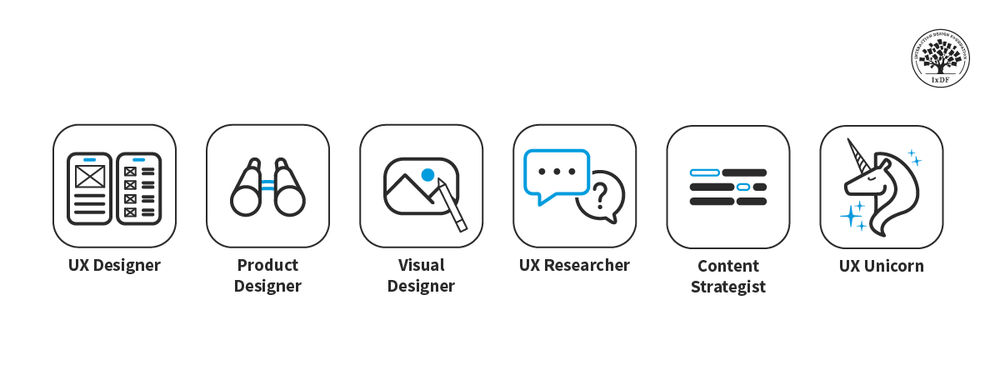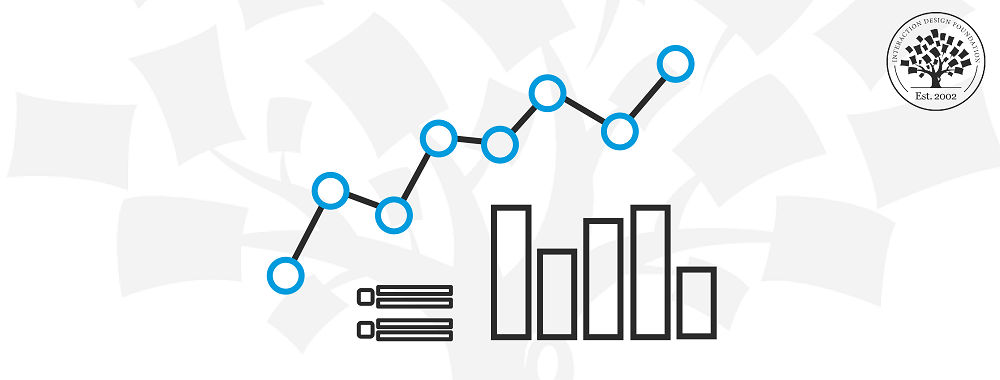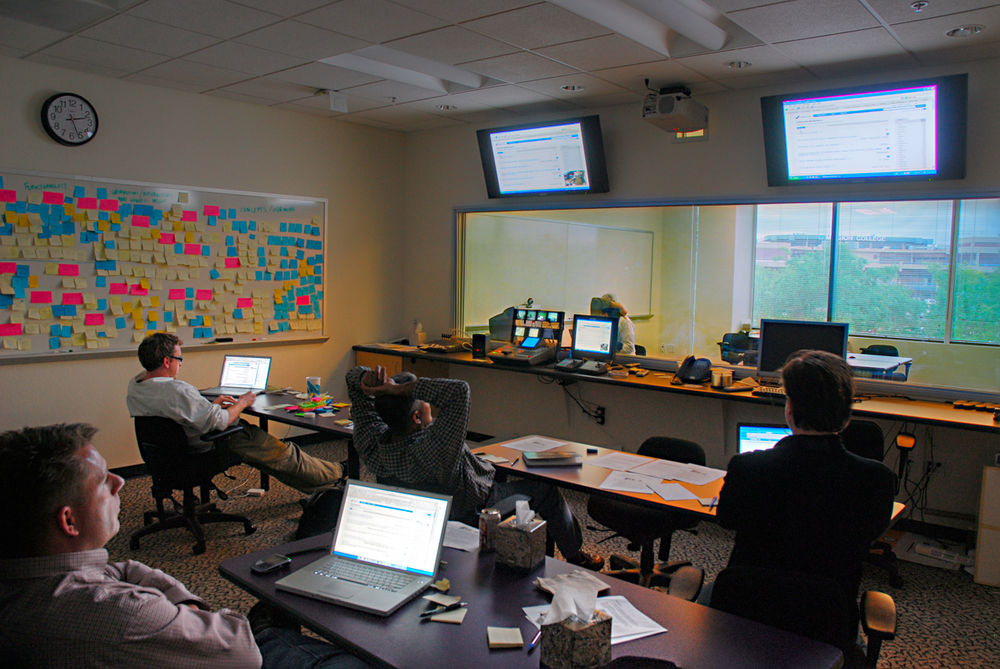If you’ve got an interview invitation for the role of UX (user experience) researcher at the organization you want to get into, well done! Your UX portfolio—one major part of why they’re interested in you—may have done the trick, but what about the UX research interview questions the hirers are going to have for you? Read on to learn how to prepare for a UX research job interview so well that you can walk into that interview with an extra spring in your step (or buzz of confidence if it’s a virtual one)!
You’re at a threshold moment with your work life. But you know this one’s something that calls for a deep understanding of the field and a mastery of research methodologies and techniques—and, at the same time, it’s just as vital to demonstrate strong problem-solving and critical-thinking skills. There’s a lot riding on your getting this role—you want to glow and grow and get into the next best thing, maybe, with what this brand might turn its hand to.
It’s not to say that it’s a “snake pit” or a “stressathon” you’re entering, or that UX researcher interview questions are excruciating, “wicked,” or set up to pick out faults and tear you down—far from it. It’s an opportunity to show and shine in what you know and that you’re well and truly ready to glow and grow into the role they’ve got waiting for you. And, as with so many other things of a competitive nature, it’s vital to be well-prepared if you’re going to stand out by far and away as the lead “contestant” and make a lasting impression in that UX researcher job interview so they come back and ask, “When you can start?!”
So, you’re going to have to focus on articulating your unique perspective and approach to the challenges of UX research—and it takes knowing the “ins” and “outs” of how the person on the other side of the desk views your craft—and covering all the questions they might ask you.
Watch as UX Strategist and Consultant, William Hudson explains important points about user research:
Table of contents
- What are UX Research Background Questions?
- What are UX Research Decision-Driven Process Questions?
- What about UX Research Technical Knowledge Questions?
- What about UX Research Adaptability Questions?
- What about UX Research Teamwork and Collaboration Questions?
- Now – Some UX Research Questions to Ask Your Interviewer
- The Take Away—And Final Tips
What are UX Research Background Questions?
You know that the “tell me about yourself” category of UX research interview questions are the ice-breakers—as in, they’re not there as a “formality” or “nicety” to defuse an otherwise-awkward atmosphere? It won’t—or shouldn’t—be awkward, anyway, but “tell me about you” is a chance to lead into what you do and what you’re about, as a UX researcher.
Sure enough, the “about me” questions do have their own importance in an interview. But the questions you’re going to face in all likelihood are going to be ones related to your overall background as a UX researcher and not what your favorite matcha is.
Here’s some good news (not that any bad news is lurking!)—it’s not going to make a jot of difference if you are starting as a UX researcher or if you’re a seasoned one. Rather, it’s that how you answer these sorts of “icebreaker” UX research questions is the first piece of evidence to give the hiring manager the insights they’ll be collecting to decide whether you can be a good fit for the role.
Questions to Expect
What motivated you to pursue a career in UX research?
How do you approach a new research project?
What is your biggest strength as a UX researcher?
How do you keep up with industry trends and advancements?
Can you describe a time when you had to handle a problematic stakeholder and how you approached the situation?
How do you handle a situation where the stakeholders have been skeptical about the project research?
What would you consider to be your most significant strengths being a UX researcher?
How did you learn about UX research, and what drives you to continue pursuing this career path?
What are Top Tips to Answer These Background Questions Confidently?
It’s good to stay ahead of the game by having the insight into the motivations the interviewer’s got for their queries, and they’re asking everything for a reason—or should be. It can be easy, say, to stray into personal territory if you landed your first UX role because of a family friend who’s a second cousin of a famous figure in the tech industry. There’ll be room for personal dimensions—as in, your passion for user experience research—but at this stage it’s best to appreciate the sequence of what the interviewer is asking, and they’ve got one purpose for asking background questions. It’s to understand your background so they can frame the next set of questions—which is where you’ve got some tips to help you.
There’s an age-old adage that will work in your favor when you use it well: “Honesty is the best policy.” It’s best to stick to it, anyway, but note the “well” part in the last sentence—and that’s because you might risk volunteering information about negative experiences (see the next point for more on that). In the main, though, there are no right or wrong answers here—so, take deep breaths, relax, and share your genuine experience freely and just “be yourself.”
Yes, it’s best not to talk about negative experiences—so even if you did have a hard ride at the last place or a rough role years before that, only mention it if it adds value to your answer. For this, it’s best to be mindful that there might be one “trap” to watch out for—not that an interview is a vicious, deliberate ploy to wreck your chances; it’s just that “trap” is the closest word that comes to mind! And it can be that an interviewer is trying to see if you’re running from something “bad” as opposed to running to them because of all the good things in their role and so for the right reasons.
So, if you’re asked to address a negative experience—as in, maybe how you handled something that was difficult or “trying”—focus on the positive steps you took to remedy the situation. Put in the important smaller aspects which you can show contributed to the big picture—as in, showing how you work and problem-solve (and that’s not unlike how your portfolio shows you off).
Another thing—don’t memorize your answers in anticipation and be ready to fire them out. It can come across as stilted and unnatural—and experienced interviewers will be able to pick up on the feel that they’re rehearsed responses. But, apart from that, your experience is personal and unique, and what you want them to value—so feel free to express it and show what you’re about!
What are UX Research Decision-Driven Process Questions?
When you’re going in as a UX researcher, any company will expect you to deal with complex situations—so you’re going to need to be able to make sound decisions based on the data gathered during research. And the interview will move on to decision-driven process questions—questions that they’ve picked to support their decision-making process best.
But back to you—they’ll want insights into how you contribute to decision making on, say, a design team, and how your ability to make the right decision can mean the difference between a successful project and a failed one. Solid user research is a vital foundational part of any design project—kind of like a runway for a heavy aircraft carrying a great deal of value to users, so it’s going to need to be a strong, well-laid one without any kinks or surprises that might spoil a smooth “take-off” or even jeopardize a design project. And your skills can shine more when you tighten the lens on your critical thinking, strong problem-solving abilities, and the ability to prioritize tasks, so be sure to bring them out in the open—by way of examples—when you’re asked.
Then—or, rather, at the same time—there’s a user-centered design dimension to consider, too. And the interviewer wants to see how strong your grasp is of the dynamic that understanding the users’ needs and expectations in fine detail will help you make informed decisions that will benefit the end user and—by association—their brand.
In this video, CEO of Experience Dynamics Frank Spillers explains how he used a diary study to research the behavior of Apple Watch users:
Questions to Expect
Can you explain how you prioritize research projects based on business needs?
How do you understand the user pain points and balance user needs with business goals during a research project?
Can you describe a time when you had to make a recommendation that was based on conflicting research insights?
How do you determine what the appropriate sample size is for a research project?
How do you make sure that research insights are integrated into the product roadmap?
What are Top Tips to Answer Decision-Driven Questions with Confidence?
For this, stay on point and focus on the results and how your research helped achieve them. If you do that, it’ll demonstrate your ability to connect research to business goals—and it will prove that you “get” data-driven design and why the quantitative research and qualitative research methods work in fueling the best insights for the good of user and brand both.
One of the beauties of an interview is that you’ve got a prime chance to respond well to open-ended questions, and you can elaborate on your answers. And note that when you’re answering research questions, it’s best to use data to support your answers whenever you can, as it will demonstrate your ability to analyze and interpret data, as well as your capacity to use data to inform decision-making.
What about UX Research Technical Knowledge Questions?
As a UX researcher—and read this post about why it’s so important—you’re going to have to polish your technical knowledge and “know your stuff,” so when you’re preparing for a UX research technical interview, it’s more than a little helpful to have a solid understanding of technical concepts. And when you’re able to sit and talk about the “techie” side like this, it will allow for more confident and articulate responses—and they’ll know you know both what to use and why it’s important to use it for that purpose.
For instance, your knowledge of relevant software—and the latest and greatest versions of it—can help you explain how you’d approach designing a user interface or conducting usability tests. What’s more, if you’ve got a good grasp of technical jargon and practices, it can help you communicate effectively with developers and engineers, vital personnel you’ll be dealing with.
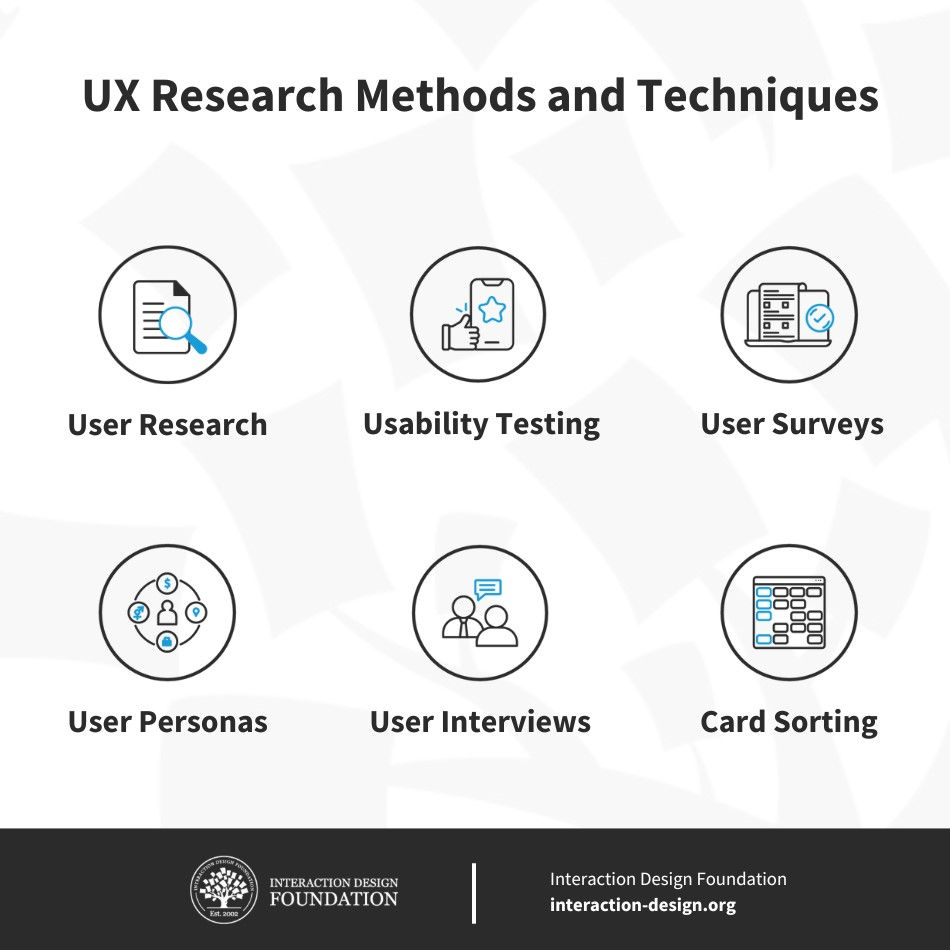
UX Research Methods and Techniques
© Interaction Design Foundation, CC BY-SA 4.0
Follow this simple rule, in any case: “Stick to what you know best.”—for the technical knowledge UX research questions.
Questions to Expect
What research methods do you typically use?
Can you walk through your process for conducting a usability test?
How do you analyze and interpret qualitative data?
How do you ensure that your research is unbiased?
Can you explain the difference between behavioral and attitudinal research?
Which tools do you use?
What are Top Tips to Answer These Technical Knowledge Questions Confidently?
Interviewers are going to expect you to have sound technical knowledge—so, if you don’t, revise the basics so you don’t get caught out, and make sure you follow the tips we’ve got for you to ace your UX research technical interview:
Focus on the specific technical skills required for the position and be prepared to demonstrate your proficiency in those areas.
Give specific examples of how you’ve applied your technical skills in past projects or work experiences, as this will show the interviewer that you’ve got practical experience and can use your skills in a real-world setting.
Use clear and concise language to explain technical concepts. And in spite of the point that jargon is helpful for dealing with the “techie” people you (hope to) get working with, avoid using jargon or complex language that may confuse the interviewer.
Highlight the areas that you’re eager to learn about—and frame it in a positive way so you don’t sell yourself short—but in any case it’s vital to be honest about what your technical skills and limitations are. For sure, it’s best not to exaggerate your abilities or pretend to have knowledge you don’t have—as, for one thing, it’s not the sort of thing you can “cram” between the interview day and a potential start day. And, more importantly, first-week disappointments in skills gaps can be cringeworthy for both sides, anyway.
What about UX Research Adaptability Questions?
Your portfolio is a valuable asset during the interview process—and one big reason is it serves as a visual representation of your capabilities and showcases the projects and methodologies which you’ve used in the past. In many cases, it’ll already have spoken volumes to the interviewer about you before you get there—user experience portfolios are like the “brand ambassadors” of designers. In any case, the content in a good portfolio helps the interviewer to understand how fast you can adapt to constant changes during a project’s duration—because, as you may know, things can (and do) come up during a typical, for example, product design process.
Join Steven Gay, UX Lead for Google One, as he shares the power of a portfolio in capturing your design journey and collaboration.
For another thing, it’s good to keep your portfolio in mind as it can help you to stay organized and focused during an interview—and you can trace back to your experience with ease when you’re answering complex questions as you present relevant examples from your previous work.
In fact, when you share real-life examples that demonstrate how you’ve applied your skills and expertise to adapt to challenging situations in specific projects, it’s something that interviewers will tick a box in your favor. And if you had what it took to achieve real-world issues for brands and clients in the past, it means you’ve got what it takes for the new potential brand, so example sharing is an approach that makes it easier to address complex questions and showcase your qualifications nice and effectively.
Questions to Expect
Can you describe a research project you are particularly proud of and why?
How did you adapt to a situation where the research insights must be aligned with stakeholder expectations?
How do you ensure that research results are actionable and impact the product design?
Can you describe a time when you had to pivot research strategies mid-project and how you approached the situation?
How have you incorporated user feedback into the product design process?
What is your best experience with any client during the project?
Can you describe your usual process for gathering information before starting any project?
Have you worked on any project that has contributed to a breakthrough for the business?
What are Top Tips to Answer These Adaptability Questions Confidently?
Be specific about the research methods which you’ve used, the challenges you faced, and the outcomes you achieved—as all of that will help the interviewer understand your thought process and research approach, pretty important assets in what’s a fast-evolving sector that calls for professionals to adapt fast, too.
Put more “oomph” into the results of your research rather than the research process—as in, put more emphasis on giving examples of how your decision-making and adaptability have improved a product or increased user satisfaction.
If you do need to gain experience in some area, just be open and honest about it—and don’t try to pretend you know more—or can do more—than you do in reality during the interview. It might even come back and “haunt” you if you get the job—when you (and they!) find out you can’t do something, so, instead, focus on your skills and how you can apply them to the job, and stay positive.
Last—but by no means least!—there’s nothing unprofessional or “unadult” about enthusiasm, so show and tell your passion for UX research, and it’ll go a long way to helping the interviewer see that you’re interested in more than landing a job and want to make a career in UX research, with them.
What about UX Research Teamwork and Collaboration Questions?
One thing about research that you’ll want to keep top of mind in an interview is how you’re not going in “solo.” And teamwork and collaboration are essential for efficient processes to work, to see problems from different perspectives, and to get real-time feedback. You'll work closely with other product development, design, and management team members, and here, the goal is to understand the users’ needs to develop effective solutions together.
Effective collaboration calls for strong communication skills—and they’re more than just a corporate buzzword; that means active listening, clear articulation, and the ability to provide constructive feedback. It’s a skill and an art to be able to listen, get points across, and give good feedback; so many people don’t—or don’t know how to—listen well (and some might even be ready with self-serving responses). Many, too—including some professionals—tend to talk at rather than to others, with closed minds or autopilot natures, and give either destructive feedback or wishy-washy or overly diplomatic “feedback” that gives a weak green light. You’re going to have to be able to conduct user interviews confidently and understand user behavior. What’s more, you’ll need to communicate research findings, insights, and the research plan to team members in a concise and actionable way.
Watch as UX Designer and Author of Build Better Products and UX for Lean Startups, Laura Klein explains important points about team research:
Questions to Expect
How do you ensure effective communication with team members during a project?
How do you handle disagreements with team members or stakeholders during a project?
Can you describe a time when you had to work with individuals from different departments or teams?
How do you make sure team members are aligned on the research goals and objectives?
Can you describe a time when you had to manage conflicting priorities on a project?
How would you resolve any miscommunication between two stakeholders associated with a project you’re leading?
How would you motivate your team members if they’re facing a problem?
Can you describe ways of tailoring the project based on different requirements?
What are Top Tips to Confidently Answer These Collaboration Questions?
The chief thing about collaboration questions is that they’re aimed to gauge your responsibility, ownership, and leadership skills—and the interviewer needs to know that you’re a team player (and not a “UX virtuoso” or “soloist”), how well you apply feedback, and how well you communicate with others as well.
You want to show how you can work with others to solve complex problems creatively and with the sort of out-of-the-box thinking—or lateral thinking—that can inspire others; as in, fire them up to iterate towards great solutions. So, it’s a great idea to explain how you’ve tackled challenging research projects in collaboration with team members to find solutions that work for everyone, and that sure can include aspects of the “tackle” like working out a clearer definition of the challenge in the problem space.
The interviewer is going to want to see that you’re enthusiastic about working with others and that you’re committed to creating a positive team environment every step of the way—so, do be sure to show that your team can rely on you to work effectively towards a common goal.
Be sure you use examples of how you’ve effectively communicated complex research insights to non-technical and technical stakeholders—and it’s vital to show that you’re a good communicator, someone who can ensure that everyone on the team understands the research findings. One reason for that is many stakeholders won’t have design or technical backgrounds (they’re out there, and they’ve got the decision-making power to green-light or pull projects).
Emphasize how capable you are to collaborate with people and research participants who’ve got different backgrounds, experiences, and perspectives, and give examples of projects where you’ve worked well in cross-functional teams and how you overcame any challenges that came up. Try to get the most relevant “case study” you can talk about and show an incisive manner in getting to the “goods” of what you did and how it worked well in concert with the other team members.
Now – Some UX Research Questions to Ask Your Interviewer
Now it’s that time of the interview when your interviewer goes, “Any questions for me?”—and this is where some interviewees might make a mistake by thinking, “Well, I’ve done my best and I feel good about it!” and that it’s over here. It’s not, though—it’s your final chance to stand out, not least because the interviewer might think if you don’t want to know (more about them), you’ll want to just go (as in, you’re not that interested).
So, when you ask things, it shows you care and are serious about a long-term relationship—but, most important of all, it’s your life and you’ll want to figure out whether the position suits your personality, interests, and qualifications. Better still, if you ask questions like the ones you’ll find below, you’ll be able to catch your interviewer off-guard (in a good way).
Questions to Inspect (Them with)
What’s the usual approach for your company for a user-centered design, and how does UX research fit into that process?
What software or tools does your organization use for research, design, collaboration, prototyping, and the like?
How does the company ensure that UX research insights get implemented effectively?
What are the qualities and attributes that can make for a successful UX researcher in the company?
The Take Away—And Final Tips
Interviews are a “two-way street”—and they’re a prime chance to engage in a careful and intentional conversation regarding the future with a potential long-term employer, one where you can shine for yourself and them, and the users and customers. The ice-breaker UX research interview questions are important lead-ins to the next sections of the interview—and while they’re basic in nature, they’re helpful in creating that first impression on your interviewer.
Keep your responses on point to meet what they ask with an incisive accuracy and attention to the details you know they’re looking for. If you know you’ve got your technical expertise in place, then be sure you give equal importance to soft skills as well.
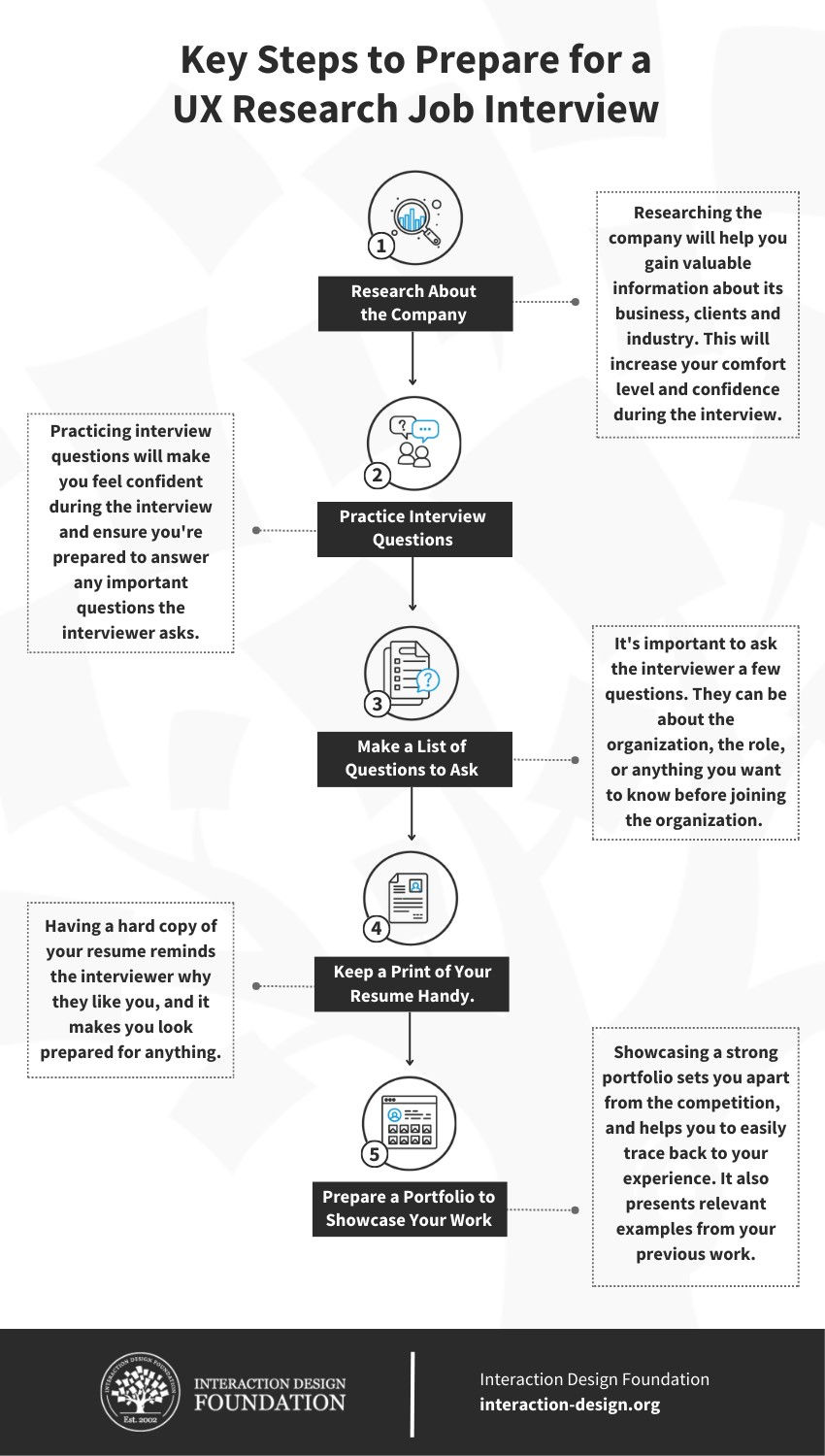
Key Steps to Prepare for a UX Research Job Interview
© Interaction Design Foundation, CC BY-SA 4.0
What’s more, it’s good practice to ask your interviewer questions, both for your own good and to show them you’re genuine about your interest, and that passion is another thing they’ll be looking for.
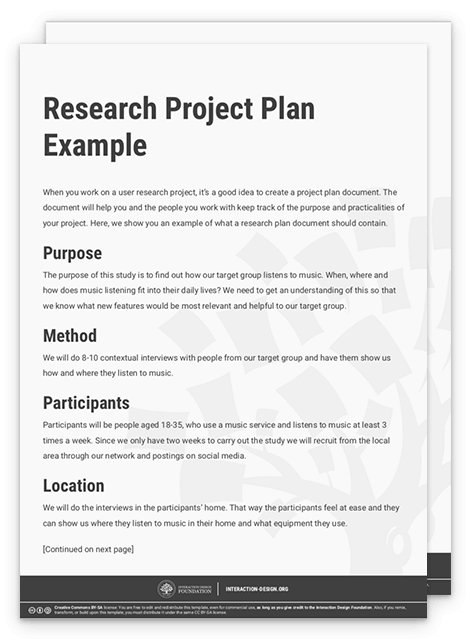

Last—but in no way least—it's equally important to highlight your ability to collaborate well and gel with team members and stakeholders. In fact, it’s good to keep a keen eye on the interviewer regarding this because they’ll be trying to also see (as a criterion for a “good fit”) the chemistry between your working nature, personality, and the like and the people you’ll be working with if it’s a “yes.” Company “politics” or mistakes in the past (as in, perhaps they had a first-rate researcher but someone who didn’t gel with others or explain things well) may mean there’ve been problems before, so you may be the “remedy”!
Overall, to interview for a UX researcher role needn’t be a stress-fest when you’ve done the preparation and envision not just what they’re going to be asking you, but why—and that “why” can bring you that element of empathy to help you see matters even better from their side of the desk. And it can also help with self-assessment and seeing how you come across for what should be—and sound to them like—the role of your dreams.
In any case, if you do need a little extra boost to complete your journey as a UX researcher confidently, take courses offered by the IxDF—a range of UX courses that will take your career to the next level. Enroll in one of our UX courses today and unleash your UX superpowers!



